Embrace AI or be labelled a ‘Dinosaur’
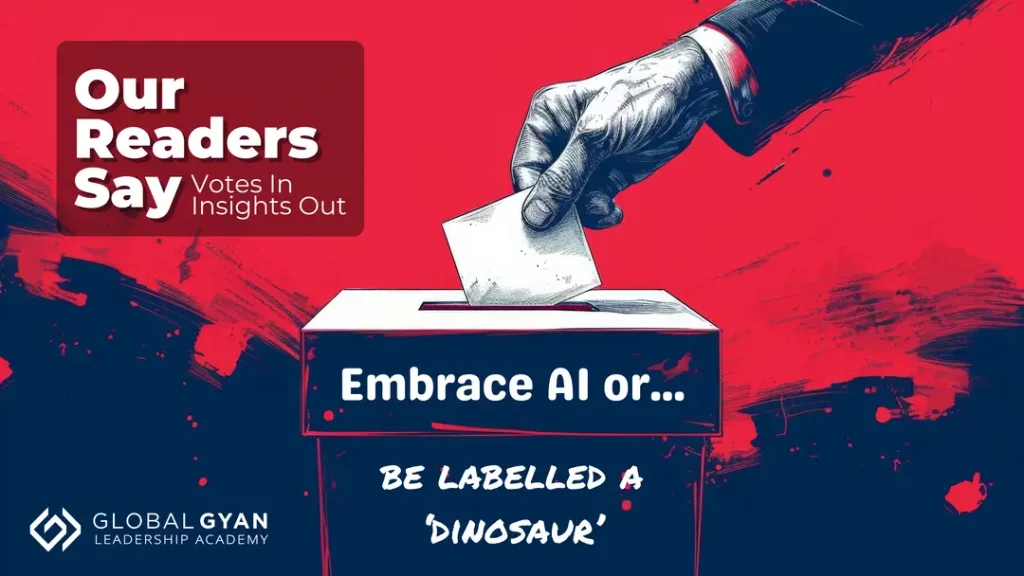
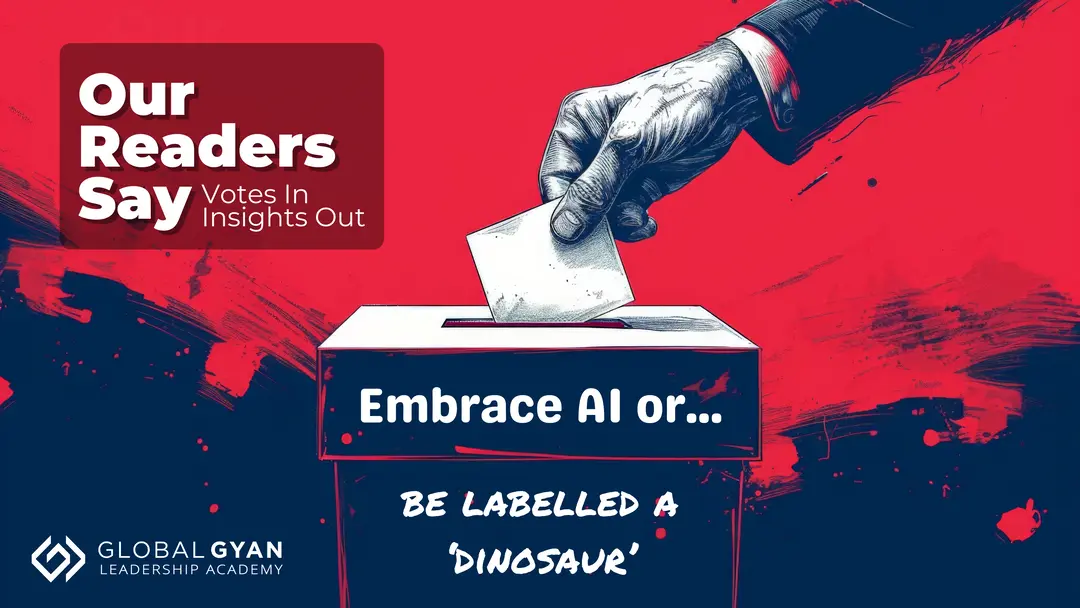
The artificial intelligence (AI) market is projected to grow 13x in the next 7 years. As one of the biggest technological advents of recent times, AI has organically permeated into much of what we do today. While businesses are increasingly becoming reliant on AI, thanks to the more than 81% of customers anticipating quick and better service, we’re curious about a more burgeoning niche: AI in the workplace; especially where managers and their teams are concerned.
Managers have had to rapidly adapt to the changes introduced by AI. However, it has also been a massive relief to their long and tedious days. An HBR survey sheds light on how managers spend more than half of their day just on administrative tasks. Managers acknowledge that this part of their job can benefit greatly from AI automation, while they in turn can shift focus on the other big areas like collaboration, strategy, innovation and nurturing talent.
Managers see such change in a positive light: Eighty-six percent said they would like AI support with monitoring and reporting..
What Our Readers Say
We posed four distinct questions to our readers to expand on the influence of AI in the Indian workplace, which has not been covered in significant detail before. Are they for or against AI usage in their teams? What are some areas where AI has truly helped them and their teams become more productive? Do they generally view AI in a favourable light when it comes to their organisation/industry as well as across industries? How do they deal with the rapid influx of complex tech in their day-to-day workflows? The responses helped to unearth insightful perspectives from this target group. Let’s break them down one question at a time.
Siding with AI but Proceeding with Caution
A staggering 81% of voters were in favour of their teams working with GenAI tools like ChatGPT & Microsoft Copilot. They cited improved efficiency and high work quality as key benefits of using these tools on a daily basis. Conversely, 12% of our readers opposed the use of AI tools, arguing that these tools disillusion team members into taking shortcuts, undermining the value of skill development and critical thinking. A larger majority (8%) of voters reinforced this stance by raising plagiarism concerns and the need for vigilant usage of AI-generated content. And finally, 5% of our voters were indifferent towards the use of AI tools within their teams as long as the work got done.
The results highlight a common thread of thought: while AI brings a barrage of benefits, it also has its fair share of pitfalls primarily surrounding the governance and ethicality of use. These balanced views reflect the nuanced considerations managers must weigh when integrating AI into their teams.
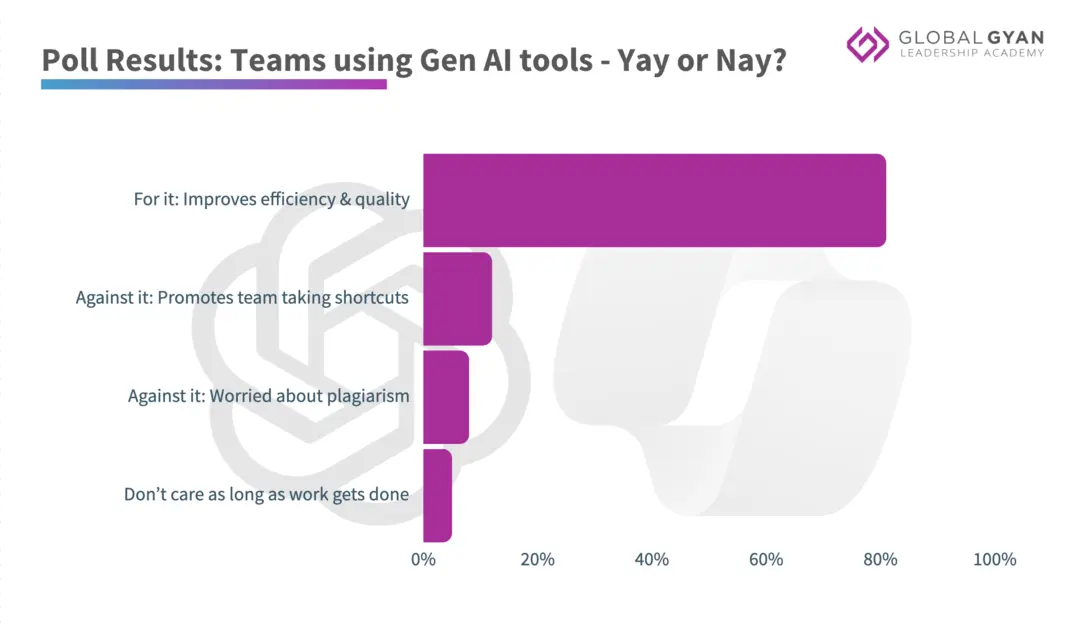
AI Content Rules the Roost… among other things!
One of the primary areas where AI has gradually gained acceptance in the corporate world is content creation, and it seems that Indians are not far behind. In fact, a majority of our voters echoed this sentiment. Nearly 34% of our voters said that they and their teams used GenAI tools predominantly to create and curate a wide array of content. Next, 26% of respondents used these tools for automating complex tasks via scripts or programming. This cohort saw AI as a valuable tool for breaking down elaborate tasks, streamlining operations and reducing manual effort.
Decision-making support by providing information received 22% of the votes. Managers found AI useful in gathering and presenting data to aid in making informed decisions, thereby facilitating efficient strategic planning. Lastly, 18% of managers relied on AI to provide market and customer insights backed by data. They believed that AI positively impacted their marketing strategies and overall business development.
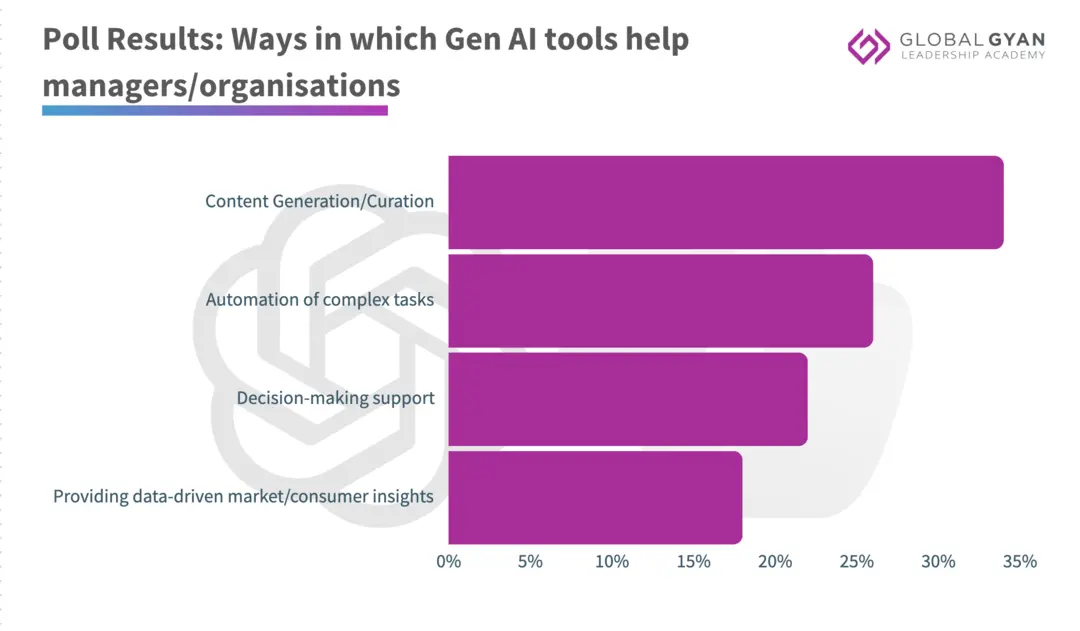
An AI Revolution is Imminent
In a moment of ultimate revelation, 85% of our voters believed that AI was here to stay and emphasised the need to pivot to stay competitive in the market. In fact, one of our voters said, “I quite like it. It makes my work easier and faster. I acknowledge that I’m going to need it more in future. I also collaborate with people who don’t use AI, and when I send them some brilliant analysis that I’ve created using GPT, I get a flurry of compliments like ‘that’s a great way of looking at it’ or ‘this is really well put together’. I gladly receive these accolades!”
A small percentage, 3%, feared that AI might make them or their functions redundant, reflecting concerns about job security and the potential displacement effects of AI. A further 9% of managers felt that AI was not yet accurate or helpful enough for their niche (organisations or industries alike) and thus, did not see it as an incumbent threat. They acknowledged the potential of AI but found its current capabilities lacking for their specific needs. Lastly, 3% were unsure how things would unfold in future with regard to AI and its increasing pervasiveness.
There is an overarching belief that the AI revolution is underway and there’s no running away from it.
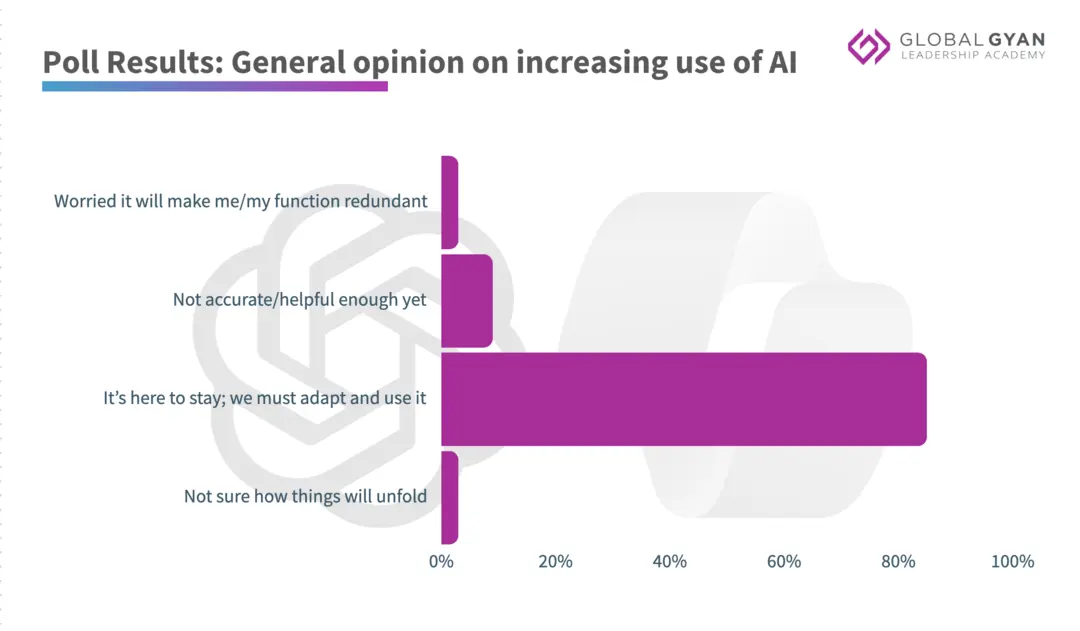
The Ubiquity of Technology
The final question centred on how managers handled the rapid proliferation of technology in their day-to-day workflow. This time, the majority votes were a lot closer than in other cases.
The most popular approach, with 38% of the votes, was to prioritise tech such that it directly served key business objectives. These managers focused on integrating technology that aligned with their primary goals and drove tangible results. Not far behind were those who sought mentorship from peers who were proficient with new tech, with 33%. This group believed in learning from others who had experience and expertise, ensuring they stayed updated and effective in utilising new tools.
Fifteen percent of managers preferred delegating these tasks to their more tech-savvy team members, efficiently leveraging their team’s strengths. Finally, 14% of managers focused on core skills and let tech experts handle new tools. They maintained their primary skill set and relied on specialists to manage and implement the latest technologies.
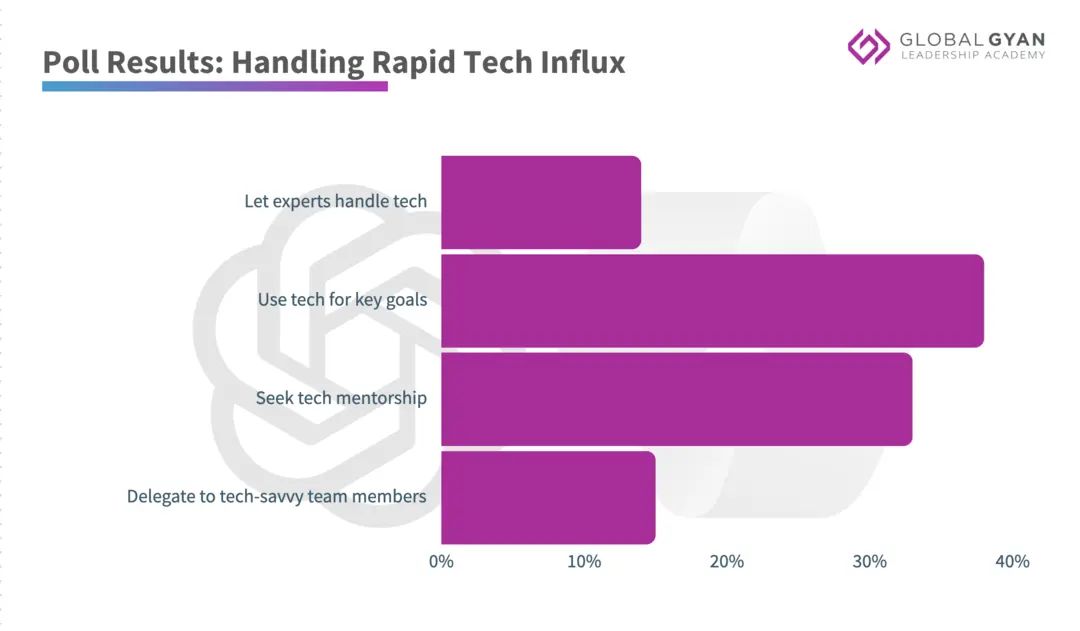
What Our Experts Say
There was a time when people would run public telephone booths as a lucrative business. With mobile phones becoming ubiquitous; they vanished. Similarly, we were told that accounting software would take away accounting jobs. But that didn’t happen. Instead, accounting jobs became more streamlined and efficient. And with the advent of tools such as Canva & Photoshop; graphic designing jobs did not disappear; they transformed.
This study also reveals something interesting: a majority of our readers believe that AI does not pose a threat to their job. This runs counter to the fear created in the media that AI will adversely impact jobs in the near to medium term. On the contrary, a vast majority of leaders seek to adapt & use AI to their benefit. In an earlier article, our experts have shed light on the benefits of establishing robust policies and workflows around working with AI; we request you to give it a read to draw actionable insights.
It is inevitable that new, disruptive technology will impact some industries/jobs more than others. But let’s not forget the waves of transformative technologies we’ve seen before and how we’ve responded to them appropriately. Our readers seem to believe AI is no different—it is all but a means to achieve the end. Moreover, while AI is learning and growing in its capabilities, so are we. At the end of the day, in this “race against a machine”, we (i.e. humans) dictate the rules insofar peaceful coexistence goes.
One thing is certain: just like the introduction of computers & machines fundamentally transformed industries a few decades ago; AI is set to transform many industries & professions in coming years. Those who embrace the change will thrive in a future that looks very different from today. Those resisting the change will have a tough time coping. Our readers and experts unanimously agree with this sentiment. Do you? Let us know in the comments below!
Pass on the Gyan!
If you liked what you read and found it useful, please share it within your network.
Our Readers Say is a series of shorter articles where we compile the voices of our reader base. If you have a compelling question that you think can help uncover incredible insights, then please write to us at sharadha@globalgyan.in. We look forward to hearing from you!






Responses